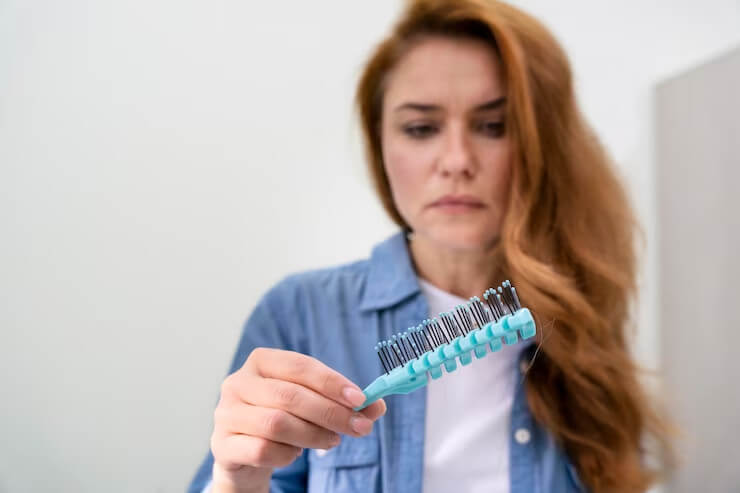
The condition of postpartum hair loss is stressful and triggering on its own during a crucial stage where a woman is already experiencing a hormonal rush. The issue of hair loss throughout the pregnancy, including post-delivery, is an extremely common concern. Those who aren’t aware or mentally prepared for this phase go through tremendous anxiety that entirely affects the mental health of the new mother. Although the reason for hair fall is quite clear – ‘fluctuating hormones’ taking care during this sensitive period can save the crown of glory up to some extent.
Some of the popular reasons for postpartum hair loss are as follows:-
The entire hair cycle is allocated into three phases: Anagen (the growth phase), Catagen (the falling phase), and Telogen (the resting phase). We all know the impact of pregnancy on hormones, it stimulates the hair in the anagen phase, also known to be the initial phase with minimal shedding. In the next 3-6 months post-childbirth, hair sets in catagen and telogen phases with a sudden drop in hormones, leading to significant avoid to reduce hair fall. The nutritional deficiencies after the delivery aggravate the hair loss result.
Ways to deal with postpartum hair loss
1. Reduce stress levels
To all mothers who are experiencing postpartum hair loss, be assured that there are solutions. Stressing over it will only aggravate the condition, leading to a spike in the cortisol hormone. The best thing you should be doing to alleviate the situation is consciously taking efforts at subsiding any kind of stress. You can ponder on meditation, yoga, music or breathing exercise, or anything that relaxes you.
2. Improve nutrition
The next best step to deal with postpartum hair loss is to focus on the overall nutrition that you are taking. Start by increasing the consumption of iron-rich foods and dairy items. Try adding leafy greens, legumes, dates, raisins, and jaggery to your regular meal. Also, don’t let pregnancy take a toll on your body, stay nourished and replenished with a bundle of nutrients to tackle health, skin, and hair issues like a pro.
3. Mental health should be a priority
The mental health of a new mom is vulnerable and fragile. Hence, it is essential to take care of mental health post-delivery to minimize postpartum hair loss. Ensure to take a break from the whole new experience of being attentive to kids 24×7. Prioritize self-care and mental health as much as you prioritize your new-born.
4. Address hair loss issues immediately
It is common to suffer from hair loss during this stage. Hence, it is important to diagnose the condition and treat it before it’s too late. Hair concerns are often neglected, and after the new-born has arrived, the priority shifts.
